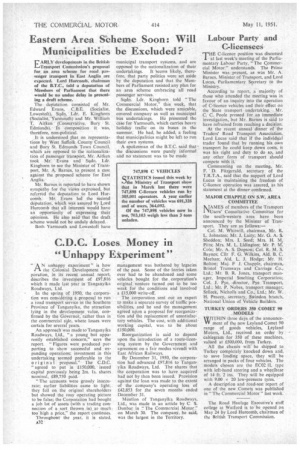C.D.C. Loses Money in "Unhappy Experiment" .
Page 34

If you've noticed an error in this article please click here to report it so we can fix it.
" AN unhappy experiment" is how the Colonial Development Corporation, in its recent annual report, describes the investment of £97,816 which it made last year in Tanganyika Roadways, Ltd.
In the spring of 1950, the corporation was considering a proposal to run a read transport service in the Southern Province of Tanganyika, the attraction lying in the development value, confirmed by the Governor, rather than in the commercial side, where losses were certain for several' years.
An approach was made to Tanganyika Roadways, Ltd., "a young but apparently established concern," says the report. Figures were produced purporting to show successful and expanding operations; investment in this undertaking seemed preferable to the origi n a 1 proposal." The C.D.C. "agreed to put in £150,000. issued capital previously being 2m. is. shares nominal, £89,750 paid.
" The accounts were grossly inaccurate; earlier liabilities came to light:. they fell on the original shareholders but showed the rosy operating picture to be false; the Corporation had bought a job lot of assets (with a trading connection of a sort thrown in) atmuch too' high a price." the report continues.
Throughout the year, it is stated.
14.32
management was bothered by legacies of the past. Some of the lorries taken over had to be abandoned and some vehicles bought for the corporation's original venture turned out to be too weak for the conditions and involved a £15,000 write-off.
The corporation sent out an expert to make a separate survey of traffic possibilities, and he and the management agreed upon a proposal for reorganization and the replacement of unsatisfactory vehicles, The cost, with additional working capital, was to be about £150,000.
Reorganization is said to depend upon the introduction of a route-licensing system by the Government and agreement on a fair modus vivendi with East African Railways.
By December 31, 1950, the corporation had advanced £97,816 to Tanganyika Roadways, Ltd. The shares that the corporation was to have acquired had not by then been issued. Provision against the loan was made to the extent of the company's operating loss of £42,853 for the seven months ended December 31.
Mention of Tanganyika Roadways, Ltd., was made in an article by C S. Dunbar in "The Commercial Motor" on March 30. The company, he said, was the largest in the Territory.




























































































